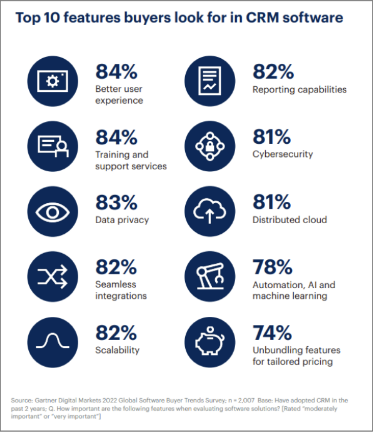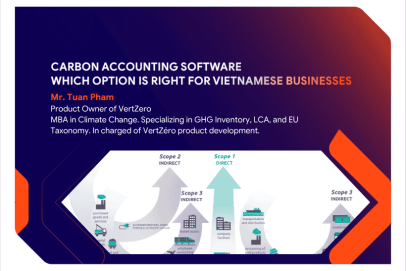Unlocking Efficiency: How Generative CRM Transforms Business Processes
CRM – Customer Relationship Management have become essential for companies to enhance their customer interactions. CRM platforms have long been helping organizations manage mission-critical customer and business data sources. However, most of these platforms still require users to spend a lot of time entering data and generating reports. And advancements in AI are causing a paradigm shift in the
workplace. AI and automation tools make 89% of employees feel more fulfilled because they can spend more time on work that truly matters.
With ~80% of CRM customers seeking AI or machine learning capabilities in software when making a purchase, the integration of Generative AI in CRM systems is emerging as a transformative trend.
Percentage of CRM buyers looking for AI and machine learning capabilities in a CRM from Gartner report.
This article is a guide for businesses to help them leverage Generative AI in CRM, as we explain its multifaceted benefits, use cases, and real-life examples.
What is generative AI CRM?
In today’s technologically driven business world, CRM systems have undergone significant transformations. From being just databases to store customer interactions, they’ve evolved into intelligent systems that offer insights and strategies for businesses. Among the most innovative evolutions in this domain is the concept of Generative CRM. Generative CRM harnesses the capabilities of AI to transform your customer data into a productivity-boosting tool. It’s designed to handle a myriad of tasks, from responding to customer inquiries and preparing dialogue, to composing emails…. As its user base grows, it becomes increasingly intelligent and swift in its operations.
Generative CRM is designed to handle the monotonous daily tasks, allowing you to dedicate your time to more significant endeavors. Its ability to rapidly search the internet and pertinent data enables it to formulate improved responses, particularly in customer service exchanges. Additionally, it can create informative articles by drawing on both current and previous interactions. Essentially, generative AI CRM combines the capabilities of generative artificial intelligence with established CRM features, enabling companies to leverage these advanced tools for enhanced business operations:
- Analyze customer data
- Derive new insights
- Generate forecasts
- Personalize interactions with the customers.
Why should businesses integrate AI into their CRM?
There are some main reasons for CRM automation:
1. The increasing volume of unstructured data that is infeasible to process without AI/machine learning
As transaction volumes expand, there is a corresponding growth in customer data volume. This escalation in data can enhance a business’s comprehension of their clientele through the processing of increased customer information. Nevertheless, this also necessitates greater effort to distill pertinent information, given that a significant portion of this data is unstructured. Despite the complexity of interpreting unstructured data, which represents approximately 90% of all data, AI technologies have the capability to transform it into structured data, thereby simplifying analysis.
Once data is transformed into a structured format, machine learning algorithms are adept at identifying trends and delivering crucial insights to enterprises. With the ever-increasing volumes of data, artificial intelligence technologies present expandable options for businesses, facilitating the management of larger datasets swiftly and more accurately.
2. The increasing need for data scientist talent
As the need for data analysis within CRM systems intensifies, so does the necessity for data scientists—experts adept at deriving meaningful patterns from complex data sets.
Yet, the scarcity and high cost of such professionals make recruitment difficult. No- code/low-code AI platforms have emerged as a solution to this dilemma, enabling companies to seamlessly incorporate AI into their CRM systems. These user-friendly platforms facilitate the automation of processes such as lead scoring and customer segmentation, granting non-technical staff the ability to tailor the CRM to their needs without extensive technical knowledge.
3. The increasing complexity of relationships
In addition to the expansion of data and the number of IT professionals, business operations and interactions grow increasingly complex with the rise in transactions. This intricacy presents challenges in comprehending corporate relationships and in the precise analysis of customer behaviors. Sales representatives allocate more than half of their CRM time to enhancing task management within the system. However, AI technology holds the potential to overcome these obstacles by automating a majority of these tasks and providing significant insights.
What are the benefits of generative AI in CRM?
Ensure data security
Generative CRM systems give top priority to the secure storage of both publicly accessible and user-submitted data. They leverage a blend of public and proprietary data to derive meaningful insights, ensuring that the private data of customers is securely safeguarded in the cloud. This two-pronged strategy guarantees the best use of data
while maintaining the integrity of data privacy.
Free up employees for high-value work
Generative CRM harnesses the power of AI to streamline everyday tasks, freeing up human resources to pursue more strategic initiatives. As it takes over repetitive duties, it empowers professionals to dedicate their efforts to intricate account management, nurturing more profound connections with clients, and devising customized solutions. Consequently, this shift not only enriches the client experience but also broadens and deepens the array of services provided.
Accelerate automation
Generative CRM transforms conventional automation by evolving static workflows into adaptive, self-optimizing processes. Rather than simply carrying out established actions, it proactively detects potential inefficiencies, recommends improvements to procedures,
and continuously fine-tunes strategies as it operates. This enables companies to maintain optimal performance levels, while remaining flexible and reactive to the ever-evolving demands of the marketplace.
Get one step closer to digital transformation
Embracing generative CRM is not just a step toward digitalization—it’s a leap into a new era of business operations. Beyond the mere recording of data, generative CRM generates insights, predicts market and client trends, and offers adaptive strategies tailored to each customer’s unique history and preferences. It symbolizes a digital transformation where businesses can dynamically respond to market changes and customer needs with the support of AI-driven insights.
What are the use cases of generative AI in CRM?
Sales Assistance
For example, considering a scenario where a sales team is tasked with identifying potential leads and customer assessment from a vast database with multiple sources. A Generative CRM could analyze customer data and enterprise data to predict purchasing patterns and identify high-value prospects. It could then assist in crafting personalized communication strategies for each lead, optimizing the sales pitch based on individual customer profiles and past interactions. This not only streamlines the lead generation process but also ensures that the sales team can focus on nurturing relationships rather than sifting through data. Moreover, by continuously learning from interactions, the CRM can refine its models to improve future predictions and recommendations, thus becoming an indispensable tool for sales teams aiming to enhance efficiency and effectiveness.
2-ways Conversation Customer Support
A Generative CRM system has the capability to produce informative articles, enhance the speed of responses, scrutinize customer feedback, and provide answers to common queries. Picture yourself in a digital conversation with a customer. In the midst of this interaction, Generative CRM is diligently searching through an extensive array of web pages and data to formulate the optimal response. As the representative, you have the opportunity to refine this response, personalizing it to ensure that the customer feels they are engaging with a human being, not a machine.
Data Collection
Generative AI has the capability to streamline the completion of CRM fields by requiring only minimal user input. For instance, simply inputting a company’s name could prompt the AI to suggest possible contacts, assign roles, and propose methods for engagement.
Consequently, generative CRM furnishes sales and service teams with pertinent data, enhancing their efficiency and effectiveness.
Image and Text Search
Generative AI can significantly enhance customer experiences in image and text search engines by providing more accurate and personalized results. For instance, when a user searches for a product, generative AI can analyze their past behavior and preferences to suggest images and descriptions that are more likely to match what they’re looking for. This not only improves the relevance of search results but also shortens the time customers spend searching for the right item, leading to a more satisfying and efficient shopping experience.
Reporting and Insight
Generative CRM can transform the landscape of sales report insights by automating the analysis of complex data sets to identify trends, patterns, and anomalies. For instance, it can predict future sales performance by analyzing past sales data, market trends, and customer behavior. Additionally, generative AI can assist in creating dynamic audience targeting and segmentation, enabling sales teams to personalize outreach and improve engagement with potential leads. This not only enhances the accuracy of sales forecasts but also provides sales representatives with real-time, personalized guidance, optimizing strategies for increased efficiency and effectiveness.
Actual examples of generative AI in CRM systems Einstein GPT (Salesforce)
Einstein GPT, crafted by Salesforce, represents a cutting-edge generative AI innovation seamlessly integrated into their CRM system. It continuously refines its comprehension through the analysis of live data, boasting the capacity to execute more than a trillion predictive assessments weekly. Moreover, its compatibility with platforms such as OpenAI amplifies its artificial intelligence proficiency, offering businesses a robust instrument to elevate their customer engagement approaches.
Generative AI for call-center CRM (IBM Consulting)
Bouygues Telecom, a leading mobile phone company, faced limitations in obtaining comprehensive insights from their existing CRM platform regarding customer interactions. To address this challenge, they collaborated with IBM Consulting to revolutionize their call center operations using generative AI. IBM implemented advanced generative AI models specifically for automatic call summarization and topic extraction. As a result, the CRM system was enriched with precise and actionable insights. This transformative advancement not only led to substantial cost savings of over $5 million but also resulted in a remarkable 30% reduction in call center operations.
FPT CX | CRM Copilot
CRM Copilot is a next generation CRM embedded Generative AI technology with supporting building entire system on both cloud and on premise for enterprise customers. With ready built-in industry-specific templates such as banking, retail, insurance, FMCG, it enables customers easily and fast into implementation and having seamless integration with legacy system. CRM Copilot is a part of FPT CX Suite that collaborates with other platforms such as Campaign Studio, Loyalty platform, Customer data platform and Commerce. This cross functional integration enhances overall customer experience and streamlines business operations. In summary, Generative CRM empowers organizations to harness the power of Generative AI within their CRM ecosystem, driving efficiency, personalization, and growth. As organizations embrace digital transformation, Generative CRM will play a pivotal role in shaping the future of customer interactions. If you’d like more details, feel free to explore Utop for CRM Copilot and its impact.
| Exclusive article by FPT IS Expert
Author Pham Nguyen Vu – Co-founder, General Director of Utop |













